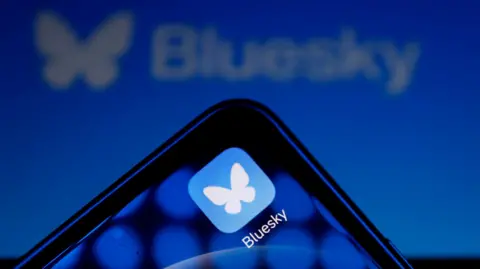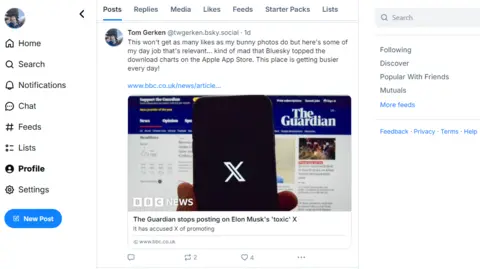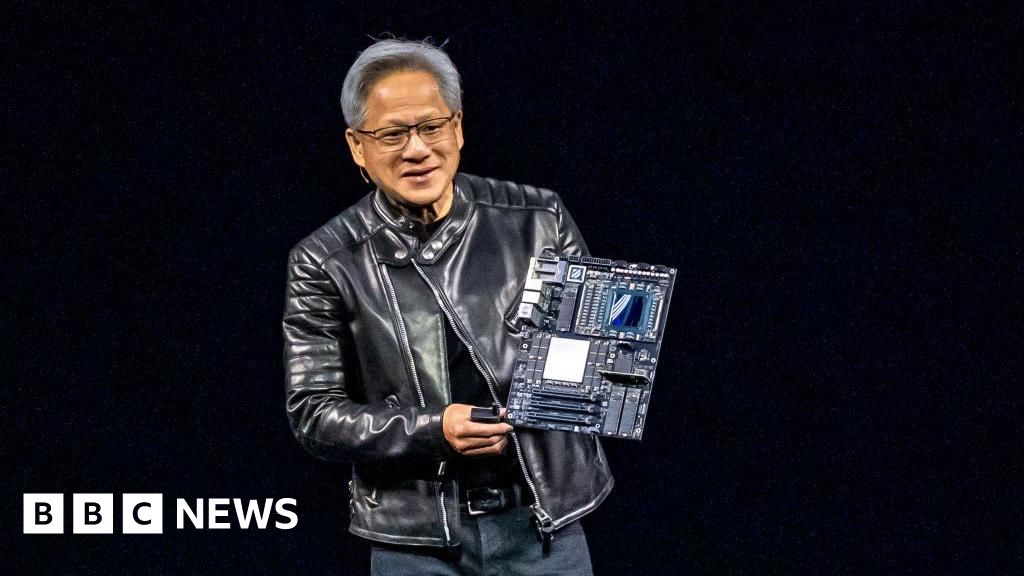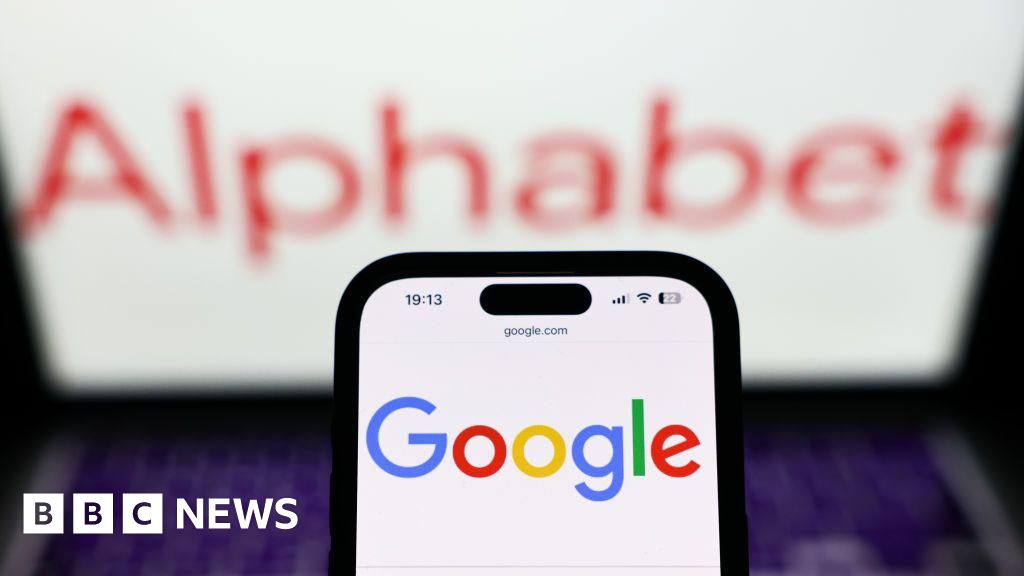ARTICLE AD BOX

 Getty
Getty
You may have seen the word "Bluesky" popping up on your social media pages recently and wondered what people are talking about.
It is an alternative platform to Elon Musk's X and it terms of its colour and logo, it looks quite similar.
Bluesky is growing rapidly and is currently picking up around one million new sign-ups a day.
It had 16.7m users at the time of writing, but that figure will likely be outdated by the time you read this.
So what is it - and why are so many people joining?
What is Bluesky?
Bluesky describes itself as "social media as it should be" - although it looks similar to other sites.
Visually, a bar to the left of the page shows everything you might expect - search, notifications, a homepage and so on.
People using the platform can post, comment, repost and like their favourite things.
To put it simply, it looks like X, formerly known as Twitter, used to look.

 Bluesky
Bluesky
The Bluesky page looks remarkably like other social media platforms
The main difference is Bluesky is decentralised - a complicated term which basically means it runs on servers that are not owned by the company itself.
This means that rather than being limited to having a specific account owned by the company, people can (if they like) sign up using an account they themselves own.
But it is worth stating that the vast majority of people don't do that - and a new joiner will most likely have a ".bsky.social" at the end of their username.
Who owns Bluesky?
If you think it feels a lot like X, you won't be surprised to learn why. The former head of Twitter, Jack Dorsey, created it.
He even once said he wanted Bluesky to be a decentralised version of Twitter that no single person or entity owns.
But Mr Dorsey is no longer part of the team behind it, having stepped down from the board in May 2024.
He deleted his account altogether in September.
It is now run and predominantly owned by chief executive Jay Graber as a US public benefit corporation.
Why is it gaining in popularity?
Bluesky has been around since 2019, but it was invitation-only until February of this year.
That let the developers deal with all the kinks behind-the-scenes, to try and stabilise it before opening the doors to the wider public.
The plan has worked, somewhat. But the flurry of new users has been so significant in November that there continue to be issues with outages.

 Bluesky
Bluesky
It is no coincidence that the number of new Bluesky users spiked following Donald Trump's success in the US elections in November.
X's owner, Mr Musk, was a big backer of Trump during his campaign, and will be heavily involved in his administration.
Inevitably, this has led to a political division, with some people leaving X in protest.
But others have cited different reasons - with the Guardian newspaper choosing to stop posting there as it called X "a toxic media platform".
Meanwhile, Bluesky's app continues to pick up significant downloads worldwide and on Thursday was the top free app in the Apple App Store in the UK.
Several celebrities, from pop singer Lizzo to Taskmaster's Greg Davies, have announced they are joining the platform and limiting their use of - or in some cases leaving altogether - X.
Other names you might recognise include Ben Stiller, Jamie Lee Curtis and Patton Oswalt.
But this growth, while significant, will have to continue for a long time before Bluesky is able to mount a true challenge to its microblogging rival.
X does not share its total user numbers but it is understood to be measured in the hundreds of millions, with Elon Musk previously saying the platform had 250 million users each day.
How does Bluesky make money?
It is the million dollar question, quite literally.
Bluesky started off with funding from investors and venture capital firms and has raised tens of millions of dollars through these means.
But with so many new users, it is going to have to find a way to pay the bills.
Back in Twitter's heyday, the site made the vast majority of its money through advertising.
Bluesky has said it wants to avoid this. Instead, it said it will continue to look into paid services, such as having people pay for custom domains in their username.
That sounds complicated but it basically comes down to a person's username being even more personalised.
For example, it may mean my username - @twgerken.bsky.social - could in the future be a more official-sounding, such as @twgerken.bbc.co.uk.
Proponents of this idea say it doubles-up as a form of verification as the organisation which owns the website would have to clear its use.
If Bluesky's owners continue to avoid advertising, they may inevitably have to look to other broader options, such as subscription features, as a way of keeping the lights on.
But if it is not making very much money, that would not be unusual for tech startups.
In fact, Twitter, before it was purchased by Mr Musk in 2022, only made a profit twice in its eight years of being publicly traded.
And we all know how that ended - a massive payday for investors when the world's richest man paid $44bn (£34.7bn) for the privilege of owning it.
For now, the future of Bluesky remains unknown, but if its growth continues, anything is possible.

 5 months ago
29
5 months ago
29








 English (US) ·
English (US) ·